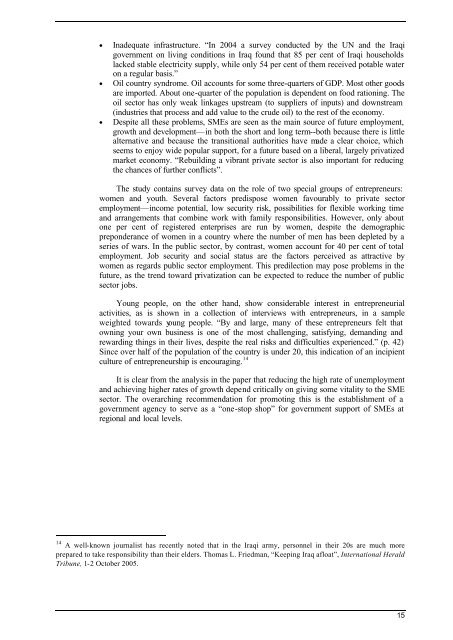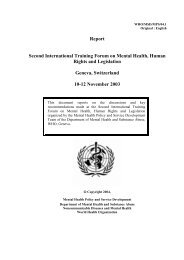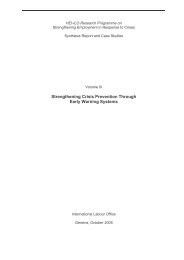Volume 1 Cedric - revised luca Final - RUIG-GIAN
Volume 1 Cedric - revised luca Final - RUIG-GIAN
Volume 1 Cedric - revised luca Final - RUIG-GIAN
You also want an ePaper? Increase the reach of your titles
YUMPU automatically turns print PDFs into web optimized ePapers that Google loves.
• Inadequate infrastructure. “In 2004 a survey conducted by the UN and the Iraqigovernment on living conditions in Iraq found that 85 per cent of Iraqi householdslacked stable electricity supply, while only 54 per cent of them received potable wateron a regular basis.”• Oil country syndrome. Oil accounts for some three-quarters of GDP. Most other goodsare imported. About one-quarter of the population is dependent on food rationing. Theoil sector has only weak linkages upstream (to suppliers of inputs) and downstream(industries that process and add value to the crude oil) to the rest of the economy.• Despite all these problems, SMEs are seen as the main source of future employment,growth and development—in both the short and long term--both because there is littlealternative and because the transitional authorities have made a clear choice, whichseems to enjoy wide popular support, for a future based on a liberal, largely privatizedmarket economy. “Rebuilding a vibrant private sector is also important for reducingthe chances of further conflicts”.The study contains survey data on the role of two special groups of entrepreneurs:women and youth. Several factors predispose women favourably to private sectoremployment—income potential, low security risk, possibilities for flexible working timeand arrangements that combine work with family responsibilities. However, only aboutone per cent of registered enterprises are run by women, despite the demographicpreponderance of women in a country where the number of men has been depleted by aseries of wars. In the public sector, by contrast, women account for 40 per cent of totalemployment. Job security and social status are the factors perceived as attractive bywomen as regards public sector employment. This predilection may pose problems in thefuture, as the trend toward privatization can be expected to reduce the number of publicsector jobs.Young people, on the other hand, show considerable interest in entrepreneurialactivities, as is shown in a collection of interviews with entrepreneurs, in a sampleweighted towards young people. “By and large, many of these entrepreneurs felt thatowning your own business is one of the most challenging, satisfying, demanding andrewarding things in their lives, despite the real risks and difficulties experienced.” (p. 42)Since over half of the population of the country is under 20, this indication of an incipientculture of entrepreneurship is encouraging. 14It is clear from the analysis in the paper that reducing the high rate of unemploymentand achieving higher rates of growth depend critically on giving some vitality to the SMEsector. The overarching recommendation for promoting this is the establishment of agovernment agency to serve as a “one-stop shop” for government support of SMEs atregional and local levels.14 A well-known journalist has recently noted that in the Iraqi army, personnel in their 20s are much moreprepared to take responsibility than their elders. Thomas L. Friedman, “Keeping Iraq afloat”, International HeraldTribune, 1-2 October 2005.15














